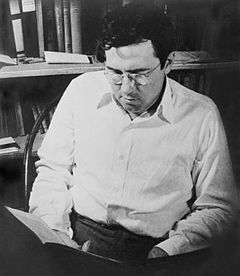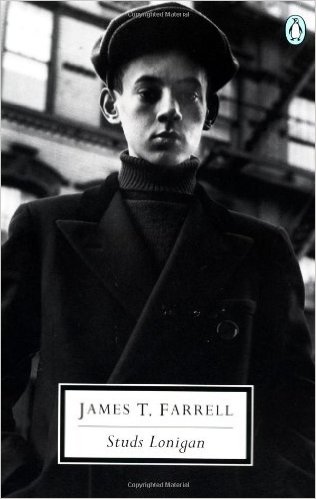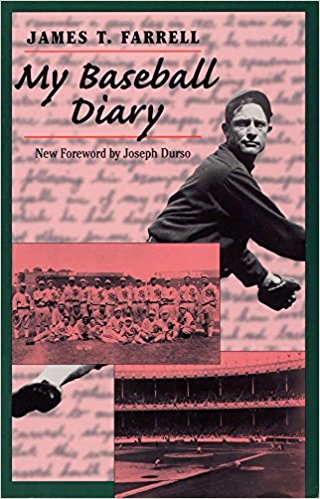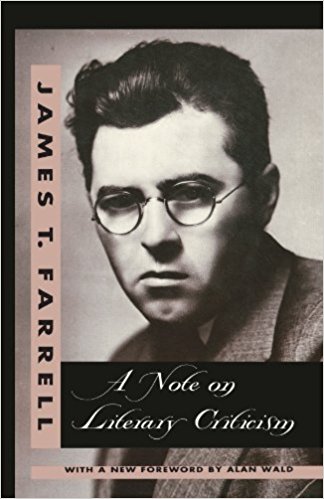Background
His father was a teamster and his mother a domestic servant. His parents were too poor to provide for him and he went to live with his grandparents when he was three.



(Collected here in one volume is James T. Farrell's renown...)
Collected here in one volume is James T. Farrell's renowned trilogy of the youth, early manhood, and death of Studs Lonigan: Young Lonigan, The Young Manhood of Studs Lonigan, and Judgment Day. In this relentlessly naturalistic portrait, Studs starts out his life full of vigor and ambition, qualities that are crushed by the Chicago youth's limited social and economic environment. Studs's swaggering and vicious comrades, his narrow family, and his educational and religious background lead him to a life of futile dissipation. Ann Douglas provides an illuminating introductory essay to Farrell's masterpiece, one of the greatest novels of American literature. For more than seventy years, Penguin has been the leading publisher of classic literature in the English-speaking world. With more than 1,700 titles, Penguin Classics represents a global bookshelf of the best works throughout history and across genres and disciplines. Readers trust the series to provide authoritative texts enhanced by introductions and notes by distinguished scholars and contemporary authors, as well as up-to-date translations by award-winning translators.
http://www.amazon.com/gp/product/0141186739/?tag=2022091-20

(First published in 1957, My Baseball Diary chronicles Jam...)
First published in 1957, My Baseball Diary chronicles James T. Farrell's enduring passion for the game, from his earliest baseball memory at the age of six through his reminiscences of his first World Series game in 1917 to his later meetings with and recollections of Hall of Famers Ray Schalk, Eddie Collins, Red Faber, Ty Cobb, and Gabby Hartnett. First published in 1957, My Baseball Diary chronicles James T. Farrell's enduring passion for the game, from his earliest baseball memory at the age of six through his reminiscences of his first World Series game in 1917 to his later meetings with and recollections of Hall of Famers Ray Schalk, Eddie Collins, Red Faber, Ty Cobb, and Gabby Hartnett. First published in 1957, My Baseball Diary chronicles James T. Farrell's enduring passion for the game, from his earliest baseball memory at the age of six through his reminiscences of his first World Series game in 1917 to his later meetings with and recollections of Hall of Famers Ray Schalk, Eddie Collins, Red Faber, Ty Cobb, and Gabby Hartnett.
http://www.amazon.com/gp/product/0809321890/?tag=2022091-20

(In this text, Farrell challenges the leading radical lite...)
In this text, Farrell challenges the leading radical literary critics of the 1930s, such as Michael Gold and Granville Hicks, reconsidering issues including the relative autonomy of literature from society and economics; the role of tradition in literary creation; the relation of literature to propaganda; and the nature of aesthetic value.
http://www.amazon.com/gp/product/0231082576/?tag=2022091-20
His father was a teamster and his mother a domestic servant. His parents were too poor to provide for him and he went to live with his grandparents when he was three.
Student of University Chicago 1925-1929. Honorary degrees Miami University, Oxford, Ohio, Columbia University, Glassboro State College, Roosevelt U., Bradley U.
He began writing when he was 21 years old. Farrell based his writing on his own experiences. Farrell was also active in Trotskyist politics and joined the Socialist Workers Party (SWP). He left the group in 1946 to join the Workers' Party.Having come to believe that only capitalism could defeat Stalinism, he left to join the Socialist Party of America. In the late 1960s, disenchanted with the political "center", while impressed with the SWP's involvement in the Civil Rights and US anti-Vietnam War movements, he reestablished contact with his former comrades of two decades earlier. Farrell attended one or more SWP-sponsored Militant Forum events (probably in NYC), but never rejoined the Trotskyist movement.
(In this text, Farrell challenges the leading radical lite...)
(A collection of Farrell's popular short stories about the...)
(First published in 1957, My Baseball Diary chronicles Jam...)
(Collected here in one volume is James T. Farrell's renown...)
(Young Lonigan by James T. Farrell. 1932 Vanguard Press fi...)
Lonely for the Future
Member Institute Arts and Letters.
Married Dorothy Patricia Butler, 1931 (divorced). Married second, Hortense Alden (divorced September 1955).; married 3d, Dorothy Butler, September 1955 (separated 1958).
Children: Kevin, John Stephen.
